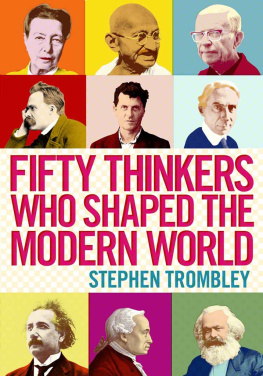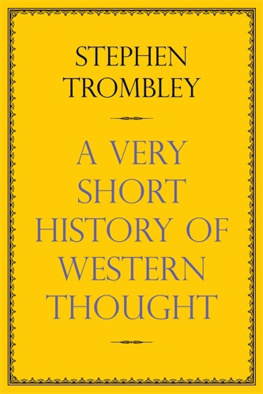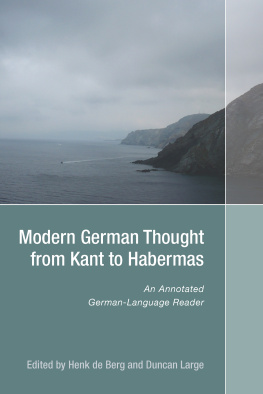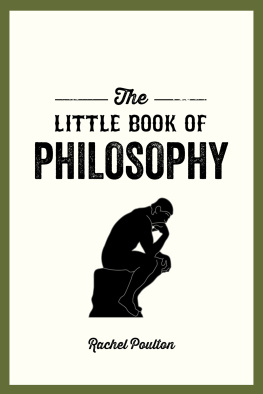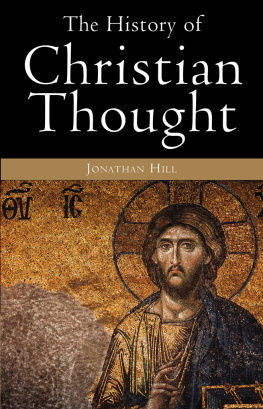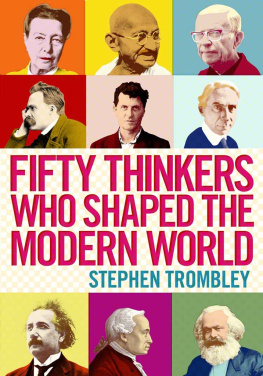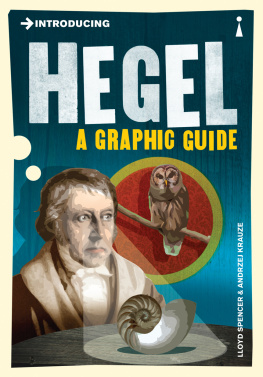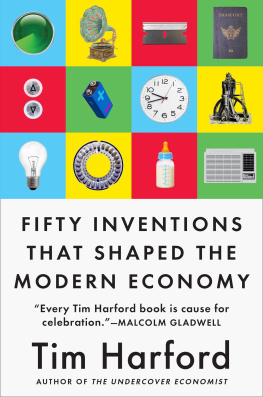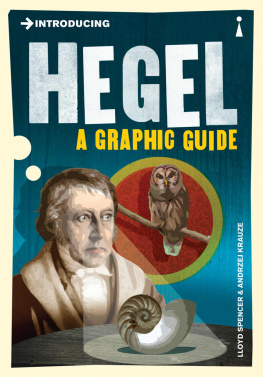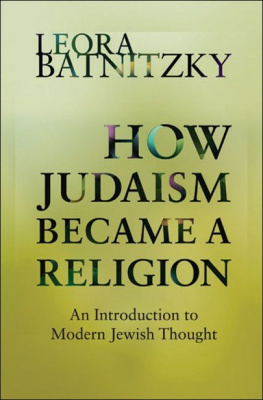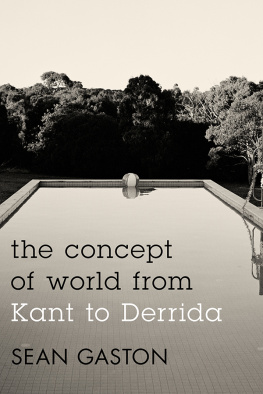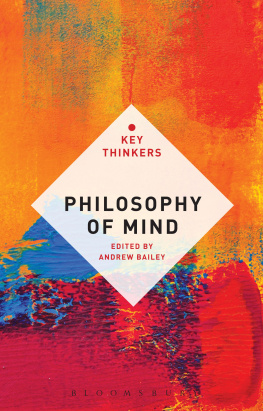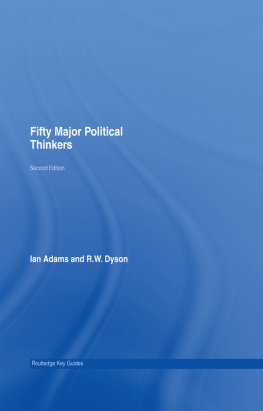FIFTY THINKERS WHO SHAPED THE MODERN WORLD
BY THE SAME AUTHOR
A Short History of Western Thought
The Fontana Dictionary of Modern Thought (ed., with Alan Bullock)
The Execution Protocol
The Right to Reproduce: A History of Coercive Sterilization
Sir Frederick Treves: The Extraordinary Edwardian
Modern British Architecture since 1945 (ed., with Peter Murray)
All That Summer She Was Mad: Virginia Woolf and Her Doctors

First published in Great Britain in 2012 by
Atlantic Books, an imprint of Atlantic Books Ltd.
Copyright Stephen Trombley, 2012
The moral right of Stephen Trombley to be identified as the author of this work has been asserted by him in accordance with the Copyright, Designs and Patents Act of 1988.
All rights reserved. No part of this publication may be reproduced, stored in a retrieval system or transmitted in any form or by any means, electronic, mechanical, photocopying, recording or otherwise, without the prior permission of both the copyright owner and the above publisher of this book.
1 3 5 7 9 10 8 6 4 2
A CIP catalogue record for this book is available from the British Library.
Hardback ISBN 978-1-84887-823-5
Trade paperback ISBN 978-0-85789-616-2
E-book ISBN 978-1-78239-038-1
Printed in Great Britain
Atlantic Books
An imprint of Atlantic Books Ltd
Ormond House
2627 Boswell Street
London WC1N 3JZ
www.atlantic-books.co.uk
For Peg Culver
Leisure is the mother of philosophy.
Thomas Hobbes, Leviathan (1651)
Introduction
The English philosopher Alfred North Whitehead (18611947) once observed that European philosophy consists of a series of footnotes to Plato (c. 428/7c. 348/7 BC ). If this is the case, then modern philosophy might be more accurately described as a series of footnotes to Immanuel Kant (17241804). Plato raised the big questions of philosophy and Aristotle (384322 BC ) created the first philosophical system but Kant is the first great system-builder of the modern period, taking into account the impact of the Scientific Revolution and the Enlightenment.
... all thought, whether straightaway (directe) or through a detour (indirecte), must ultimately be related to intuitions, thus, in our case, to sensibility, since there is no other way in which objects can be given to us.
Immanuel Kant, Critique of Pure Reason (1781)
(trans. Paul Guyer and Allen W. Wood, 1998)
For Kant, philosophy is about man having reached the age of intellectual maturity, when the universe can be explained through thinking rather than revelation. He was profoundly influenced by the Scottish philosopher David Hume (171176), whom Kant credits with awakening him from a dogmatic slumber. In his Prolegomena to Any Future Metaphysics (1783) Kant said that, after reading Hume, I could proceed safely, though slowly, to determine the whole sphere of pure reason completely and from general principles, in its circumference as well as in its contents. This was required for metaphysics in order to construct its system according to a reliable plan. This groundwork led to Kants masterpiece, his Critique of Pure Reason (1781, substantially revised in 1787). Inspired by Enlightenment thinking about freedom and experiencing the effects of war first-hand when his hometown of Knigsberg was under Russian occupation during the Seven Years War (175663) Kant argued that knowledge and freedom went hand in hand. He explored these themes in two further critiques: the Critique of Practical Reason (1788) and the Critique of Judgement (1790). The Critique of Pure Reason identifies laws that govern science, while preserving free will. The Critique of Judgement considers aesthetic judgements, and teleological questions about the purpose of natural organisms and systems.
One of the most enduring aspects of Kants philosophy is his ethics, with its categorical imperative. The categorical imperative says that I must act in such a way that the action I am choosing should become a universal law that should be applied to anyone else finding themselves in similar circumstances. Here Kant argues against a consequentialist ethics like utilitarianism. Utilitarian ethics say the right course of action is that which gives the greatest amount of good to the greatest number of people. Utilitarianism is consequentialist because it urges me to seek the best consequences, which, Kant argues, is no more than my animal self would do. For Kant utilitarianism is not a moral theory because it does not take sufficient account of the difference between animals and persons, i.e., mind. In seeking the categorical imperative for our actions, we are using what Kant calls pure practical reason to arrive at a maxim that would govern our actions. This is called deontological ethics: finding and observing a moral rule, rather than defining good by its consequences.
Kants philosophy of transcendental idealism in which the perceiving subject partly assigns meaning to the external world would set the agenda for the further development of German idealism and much of twentieth- and twenty-first century continental philosophy.
The age of revolutions
The age of Enlightenment was also the age of revolutions. The English civil wars (164251) pitted parliamentarians against royalists. The American Revolution (177583) saw New World colonists rebelling against the rule of the English king, inspired by the ideas of the English philosopher John Locke and the French philosopher Jean-Jacques Rousseau (171278) on the social contract; this was the creation of the United States of America. The French Revolution was fuelled by Enlightenment political ideas about the rights of citizens. King Louis XVI (175493)was executed and today France is a democratic republic, although there were several slips twixt cup and lip.
The execution of kings (England executed Charles I in 1649) was the final nail in the coffin of rule by divine right. By 1848 it was truly the Age of Man, but the first cracks in the new post-Enlightenment social organization began to show. New science led to new technology and the Industrial Revolution. Machines now mechanically multiplied the amount of goods that were formerly manufactured by hand. Workers left their agrarian lifestyle (and the agricultural market) and swelled the cities, where the factories were located. Overcrowding, disease and crime followed, all fuelled by poverty as laboured worked long hours for low wages. They suffered a new kind of fatigue, new injuries and new insults to their sense of self-worth. Meanwhile, the owners of manufacture capitalists grew richer. The gap in earnings between the rich industrialists and the poor, exploited workers made conflict inevitable.
The materialist doctrine that men are products of circumstances and upbringing, and that, therefore, changed men are products of changed circumstances and changed upbringing, forgets that it is men who change circumstances and that the educator must himself be educated. Hence this doctrine is bound to divide society into two parts, one of which is superior to society. The coincidence of the changing of circumstances and of human activity or self-change [Selbstvernderung] can be conceived and rationally understood only as revolutionary practice.
Karl Marx, Theses on Feuerbach (1845)
(trans. W. Lough, 1969)
Europe in 1848 was the year of revolutions, with uprisings in France, the Italian and German states (those countries were not yet unified), Hungary and Ireland. One result of the Enlightenment philosophy that brought science, technology, politics and jurisprudence was a new capital-based ownership class, a middle class of managers and a working class of the exploited. Philosophy replied. The socialism of Karl Marx (181883) and Friedrich Engels (182095) was a direct response to the misery that accompanied capitalism and the accumulation of wealth by a few at the expense of the many.
Next page
